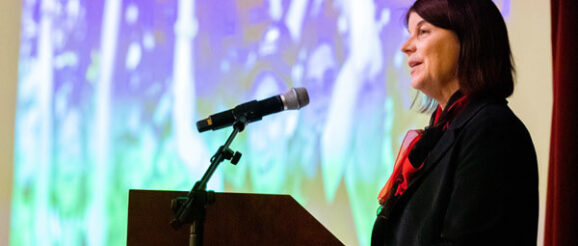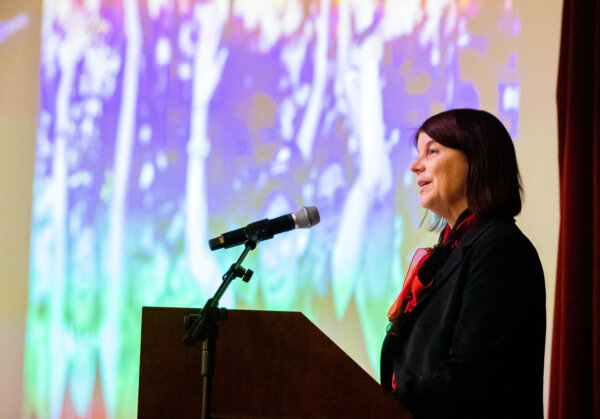President Freeman highlights student success, innovation, shared leadership during State of the University address

NIU is “the university for this century – and the next century.”
President Lisa Freeman reached that conclusion in 2009 during her on-campus interviews for the job of vice president for Research and Graduate Studies.
 “I looked around and I saw so much here that made this the university for the future,” Freeman recalled during Tuesday’s State of the University Address.
“I looked around and I saw so much here that made this the university for the future,” Freeman recalled during Tuesday’s State of the University Address.
Her encounters included “students who were so talented and so ambitious and so committed to giving back,” she said.
Freeman also met “faculty and staff who didn’t think that teaching undergraduates was an inconvenience but rather a calling,” she said, “and who knew that incorporating those students into the work they did outside the classroom was going to be transformational for their scholarship and for students’ lives. Not every university has faculty who think that way.”
Twelve years later, Freeman continues to regard and promote such thinking as integral to NIU’s perpetuity in a time “when the value of higher education is being questioned.”
“Student success needs to be at the forefront of our minds when making decisions,” Freeman told her in-person and online audiences. “That is our greatest responsibility: to do everything we can to help our students be successful so that they can achieve their goals and positively impact others at NIU and beyond.”
Doing so requires more of the kind of collaboration already underway, she said.
University leaders were “more intentional” in the past year in “bringing people together and tapping into the diverse talents, expertise and viewpoints of our community to create solutions and reach our goals,” she said. “How we face our challenges is absolutely shared leadership.”
As a result, she added, NIU is more effective and impactful in student recruitment and retention, revenue generation and process improvement.
Growing NIU’s enrollment, meanwhile, encompasses not only competing well for the shrinking number of new high school graduates but also attracting prospective students who’ve opted out, dropped out or are currently working but need bachelor’s degrees to advance on the job.
“Our Huskies are forging brand new paths for themselves, their families and their communities. That takes incredible courage and determination,” Freeman said. “It also takes caring and intentional employees who surround our students with resources, reassurance and opportunities to help them persevere. If shared leadership is how we’re going to do things, student success is the why.”
Connecting student success to shared leadership and innovation – three concepts “intrinsically linked together and essential for our future” – is already paying dividends while also “helping all Huskies feel they belong here at NIU.”
- Year-over-year growth in enrollment of incoming first-year students continued this fall as the student body became more diverse, mirroring the makeup of the region and reflecting the university’s commitment to access and affordability.
- The average high school GPA of this fall’s freshmen class is 3.42, the highest on record.
- Engagement of students at the start of the fall semester was “remarkable” and showed their “extraordinary eagerness to meet others, form connections, get involve, learn about resources and become successful.”
- Representatives from Academic Affairs and Student Affairs proactively reached out to offer assistance to more than 900 students struggling with coursework, mental health, finances or food and housing insecurity.
- Teams from across campus developed meaningful and actionable recommendations for how to enhance recruitment, retention and persistence to graduation.
- Members of the Budget and Planning Work Group, meanwhile, advocated for sustainable, multiyear spending plans that reflect dynamic priorities, investments in equity and funding that incentivizes outside-the-box thinking.
“We know from experience that taking a shared-leadership approach to problem-solving, innovation and change delivers results – tangible and significant results,” Freeman said.
“Achieving these outcomes requires abundant organizational readiness and capacity, so we are investing time and resource into more on-the-job learning experiences, networking opportunities and purposeful professional development for our faculty and staff,” she added.
“Part of being innovative is taking risks and having things fail; you can’t be timid about making mistakes. If you don’t try something, you won’t know if it works, and if you try something and it doesn’t work, it gives you information about what to try next.”
Consequently, she said, “part of building organizational capacity for shared leadership is making people feel less timid and more bold about taking risks and trying next things. Whether what they want to try is about conserving resources or serving students or attracting faculty, those ideas should be surfaced and considered.”
One recent example, the president announced, is an expanded program of staff awards that includes the Staff Award for Student Impact, the Rising Huskie Award and the Presidential Award for Creativity and Innovation, the latter of which honors groups or teams.
AWARDS OF A DIFFERENT KIND are expected to fuel NIU’s commitment to innovation.
The university is establishing an enterprise-level office in the Division of Research and Innovation Partnerships to consolidate and expand NIU resources available to facilitate and support transdisciplinary research, scholarship, artistry and engagement throughout campus and with other universities and institutions.
“Increasingly, contemporary issues demand that artists, scientists and humanists innovate together, beyond disciplinary boundaries, to bring new ideas and solutions to light,” Freeman said.
Sustaining excellence “means changing our systems to align with diverse and evolving forms of scholarship,” she added, “and crediting appropriately the accomplishments of those whose work has relevance and impact outside of traditional academic boundaries.”
“NIU needs to prepare students and scholars to build on their disciplinary foundations by broadening their thinking; being open to integrating additional concepts, theories and methods; and accepting as legitimate work that crosses disciplinary boundaries is collaborative or solutions-focused,” Freeman said.
“We must value and reward the work of scholars who seek to blur disciplinary boundaries in their teaching and learning; scholars who are publicly engaged; scholars who support mission-driven work around DEI; and scholars who are innovators and entrepreneurs creating new technologies.”
Members of the NIU Faculty Senate have prioritized the need to recruit and retain faculty of color and from underrepresented backgrounds, Freeman said, adding that those scholars want to work in “communities where they feel they matter and they’re recognized.”
“One of the strategies that we have not yet attempted that’s been suggested, and actually appears in this year’s university goals, is the strategy of cluster-hiring,” she said, “bringing in a cohort of faculty, not necessarily in the same department or the same college but with similar interests and the ability to form a community almost immediately upon coming here.”
PRESERVING NIU’S VITALITY is not just an on-campus concern, the president said.
Faculty and staff continue to drive NIU’s momentum in attracting external dollars, she added: Funding not related to COVID-19 has grown to $42 million, 11% higher than last year and representing a climb of nearly 40% over the last five years.”
Global challenges such as climate change underline the “pressing need for leadership, expertise and effort focused on sustainability and climate science, and NIU has enviable capability in both areas,” the president said.
Included in that are the forthcoming Health Informatics Technology Center and the U.S. Geological Survey’s Central Midwest Water Science Center, which will occupy the former NIU print shop space.
State officials, meanwhile, already have begun the design-build phase of the $23 million Northern Illinois Center for Community Sustainability.
“Part of the Illinois Innovation Network, the center will work to improve water resources; predict and manage environmental change; and stimulate innovation in food systems,” Freeman said. “It will build upon momentum created by our Institute for the Study of the Environment, Sustainability and Energy.”
Even more locally, she said, the efforts of NIU’s Courtney Gallaher and the Sustainability and Climate Action Planning Task Force will establish concrete goals for a more sustainable university in areas such as transportation, food production, renewable energy, buildings, grounds, recycling, waste management and more.
The task force also will outline a climate action planning process and set a target for the campus to reach “net zero” greenhouse gas emissions by 2050 or earlier.
“Sustainability aligns perfectly with our mission and encompasses DEI initiatives through environmental justice. It’s also the best choice from a long-term operational standpoint – it makes financial sense,” Freeman said.
“Most exciting is that our students will be central to the effort,” she added. “As our campus is transformed to a living laboratory on sustainability, they will be provided with a multitude of hands-on learning experiences and opportunities for climate action.”
Freeman also pointed to NIU’s close relationship with DeKalb and DeKalb County.
“NIU has a seat at the table, and NIU is on the other end of the phone when a company like a Ferrara or an Amazon or a Syngenta is thinking about where to locate,” she said. “We have an opportunity to submit materials to tell them about the educational experiences we can offer their early-career employees and their senior employees. We can talk about what an asset our students are to providing an educated and skilled workforce for any company that wants to come here.”
Through those conversations, she added, “we’ve really also turned our thinking to saying, ‘It’s not just important to attract industry here. It’s important to create a community where students who attend NIU want to stay and live and start businesses and raise families.’”
KEEPING STUDENTS IN MIND is key to realizing the university’s goals and for laying the groundwork for “even greater results,” the president said.
NIU’s Strategic Enrollment Plan 2.0, for example, maps out strategies for improving access, affordability and persistence to graduation, as well as for re-enrolling students who stop-out and for assisting working adults interested in upskilling for advancement.
“From college prospect to college graduate, we are responsible at all stages for helping undergraduate and graduate students achieve their dreams,” Freeman said. “We must all be involved in exploring more-tailored approaches to recruiting and retaining students, closing equity gaps, embracing accountability and driving progress.”
Working toward that is Clint-Michael Reneau, who joined the university in June as vice president for Student Affairs, and his team.
Their efforts in “reimagining what engagement looks like and creating a community of care” include the introduction of “Conversations that Matter,” a twice-monthly dinner series that invites students to share meals and their voices with NIU’s senior leadership.
“His passion for students is palpable,” Freeman said of Reneau. “Opportunities like this build connectivity, let students know we’re here for them and give us another way to learn more about our students and how we can support them.”
At the graduate level, meanwhile, Provost Beth Ingram and Dean Kerry Wilks recently completed an assessment of programs and experiences.
They identified actionable recommendations to create a graduate student community that supports its success; to set expectations for graduate student stipends and mandatory fees; to align tuition waivers to support graduate student success; and to ensure adequate resources for strong and strategic programs.
It all works toward maintaining and boosting NIU’s viability in a time when “the gap between affluent and underserved continues to grow, increasing divisions among us.”
“Our endeavors have never been more important to our state or nation. There is growing need for an educated and skilled workforce to serve our region, while the pipeline of college-age students continues to shrink,” Freeman said.
“Our university can make a difference – as a creator of opportunity, producer of talent, convener of thought-leaders and generator of ideas,” she added. “We are at our very best and strongest when we are together. That’s true in how we champion our students and tackle our challenges. ‘Strongest together’ also reflects who and what we value. Huskies know they are not alone.”
The full State of the University Address is available by visiting the President’s Office website.
